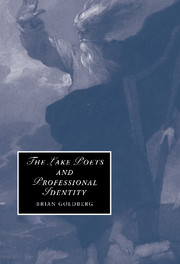Book contents
- Frontmatter
- Contents
- Acknowledgments
- Introduction: Professionalism and the Lake School of Poetry
- Part I Romanticism, risk, and professionalism
- Part II Genealogies of the romantic wanderer
- Part III Romantic itinerants
- 4 Authority and the itinerant cleric
- 5 William Cowper and the itinerant Lake poet
- Part IV The Lake school, professionalism, and the public
- Notes
- Bibliography
- Index
4 - Authority and the itinerant cleric
Published online by Cambridge University Press: 14 January 2010
- Frontmatter
- Contents
- Acknowledgments
- Introduction: Professionalism and the Lake School of Poetry
- Part I Romanticism, risk, and professionalism
- Part II Genealogies of the romantic wanderer
- Part III Romantic itinerants
- 4 Authority and the itinerant cleric
- 5 William Cowper and the itinerant Lake poet
- Part IV The Lake school, professionalism, and the public
- Notes
- Bibliography
- Index
Summary
When Richard Savage and James Beattie confront the institutions of patronage, they address elements of professional identity, such as the self-evaluation of merit and the proper use of experience, that they would want to quarantine from patrons and the marketplace alike. By the 1790s, when the Lake poets begin writing their own wandering verse, itinerancy and vagrancy connect new versions of the poetic career to specific late-century concerns, re-focusing the wanderer trope and involving it in different fields of reference. Thus, critics such as Gary Harrison have associated Romantic “wandering” with homelessness, a special problem in an era of warfare and economic upheaval; as he puts it, the “increasing numbers of discharged soldiers and destitute beggars” in the late eighteenth century means that the “ennobling poverty” of the traditional minstrel “threatens to become disabling indigence” at the level of the poetic character. Others have emphasized that the actual mobility of the Lake poets and their doubles is a marker of class privilege, since, in the 1790s, “deliberate excursive walking” is a new activity for the “relatively well-to-do and educated.” All suggest that the poets, with Wordsworth as the defining example, experience a paradoxical form of authorship wherein poverty and obscurity, and success and honor, are closely related. The long developmental tale of The Prelude may be said to recuperate the poet's suspect wandering by closing it out with a suffusing statement of vocational purpose: “[W]hat we have loved/others will love, and we may teach them how,” the poem finally states, and the mission that joins Wordsworth and Coleridge separates them from the mere beggar as well as from Beattie's less conclusively drawn minstrel.
- Type
- Chapter
- Information
- The Lake Poets and Professional Identity , pp. 125 - 165Publisher: Cambridge University PressPrint publication year: 2007



